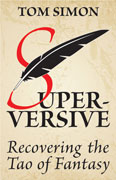This past Friday I received two books from Amazon, and passed the whole night and most of Saturday morning in an orgy of reading. First, as an hors d’oeuvre, I read C. S. Lewis’s collection The Weight of Glory, which is much less known than it ought to be; it contains some of Lewis’s best work. The main course was The Last Dark, the tenth and absolutely last of Stephen R. Donaldson’s Thomas Covenant books.
Told by an idiot, No. 6
The self-publishing industry has allowed anyone with a computer and a small amount of money to call themselves authors. Not long ago, I read a fascinating article in the New York Times (unfortunately, I haven’t been able to find it when I did an Internet search) that questioned whether self-published authors should be called published authors. Rather, the article suggests, they are book writers who have their books printed. There is, I believe, a significant difference between authors published by traditional houses and self-published books in that the latter lack the processes that we can count on to ensure a minimal level of quality, both of content and style.
—Dr. Jim Taylor, ‘Are Self-published Authors Really Authors or Even Published?’
How glad I am that a sane, sensible, and official person has weighed in on this important issue. It is manifestly obvious that a self-published author is no author at all, and that a self-published book is not published. And since a book must have an author, it is surely evident that a self-published book is not even a book. What it is, I cannot say: a new variety of spam, likely.
[Read more…]
Science fiction or fantasy? A rigorous definition
If there’s a zeppelin, it’s alternate history. If there’s a rocketship, it’s science fiction. If there are swords and/or horses, it’s fantasy. A book with swords and horses in it can be turned into science fiction by adding a rocketship to the mix. If a book has a rocketship in it, the only thing that can turn it back into fantasy is the Holy Grail.
—Debra Doyle
Told by an idiot, No. 5
If it sells, it’s crap.
If it doesn’t sell, apply for a grant.
(signed)
H. Smiggy McStudge
Told by an idiot, No. 4
An artist’s reach must exceed his grasp, or what’s an artist’s statement for?
The enormity of our semiotic struggle with reality and truth far exceeds the capacity of mere human language to express; that is why we express it in language. If it merely exceeded the capacity of music, we would have been composers instead.
Only plebs and pikers actually say what they want to say. Real literature consists in saying that what you want to say cannot possibly be said.
(signed)
H. Smiggy McStudge
Told by an idiot, No. 3
You must always know exactly what your work is about. If anyone asks, you must be able to express your theme in one sentence, like this:
‘This [novel, story, poem] is about the futility of life in a post-postmodern world of transvaluated values, and the radical failure of the spirit in the face of human cruelty and cosmic despair.’
If this exact sentence does not describe your work, you are writing the wrong story. Get it right, or throw it out.
(signed)
H. Smiggy McStudge
Told by an idiot, No. 2
The true artist must always suffer for his art. If you don’t suffer for your art, you won’t know how to make other people suffer for it when it’s their turn.
As Robert Frost nearly said, ‘No cries of agony in the writer, no cries of agony in the reader.’
(signed)
H. Smiggy McStudge
Happy (Half a) Hobbit Day
In honour of Bilbo and Frodo’s birthday, I wish to offer the following long-belated response to Bilbo’s famous compliment (or insult) at the Long-Expected Party:
I don’t know half of you half as well as I should like, and I like less than half of you half as well as you deserve.
That’s all right, Mr. Baggins. If you knew me half as well as you liked, you would soon discover that I deserve to be liked less than half as well as you like more than half of the Hobbits that you like half as well as they deserve. And I say this, which is half of what I should like to say, on behalf of the other half.
Selections from the Octopus
Strange are the tongues of mortals: you say so much that you do not mean, and yet mean so much more than you say.
—Talanel, seeress of the yrani, in The Grey Death








Recent Comments